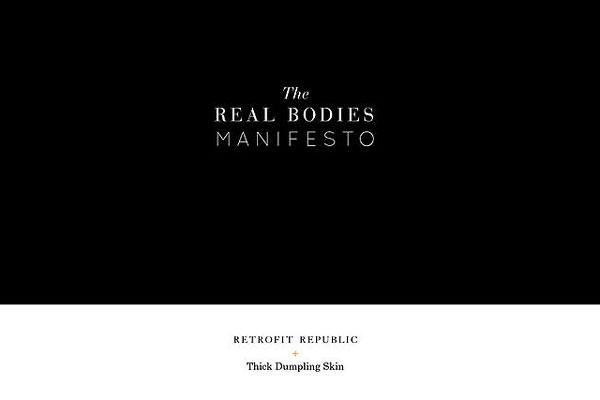
A note from Thick Dumpling Skin’s co-founder, Lisa Lee:
Almost a year ago, Retrofit Republic’s Community Heroes Lookbook landed on my radar.
I drooled over this lookbook at my desk, and almost died of happiness that they used real people in their fashion spreads. No wait, I take that back. I loved that they not only used real people in their fashion spreads, they wholeheartedly incorporated them and allowed fashion to ride on the wave of their stories.
That very day, the wheels in my head started to turn. I remember calling Lynn, so excitedly, and told her that I wanted to see something like that for Thick Dumpling Skin. I wanted us to highlight Asian American bodies and show off the beauty that carry us through thick and thin. They say that a picture speaks a thousand words, and how appropriate that we would use the very vehicle that has hurt us before, to change how we see ourselves?
Last week, we launched The Real Bodies Manifesto Lookbook with Retrofit Republic. Every time I see the images, and read the words of our models, I feel tiny goosebumps. However, since I am not fantastic with words, I’ve asked Yumi Pak, our most graceful model yet, to share some of her thoughts about the meaning of The Real Bodies Manifesto.
By Yumi Pak
Things I could have been nervous about, the day of the Real Bodies Manifesto photoshoot: BART running late; the makeup artist doing my eye makeup like I have a crease; being awkward in front of the camera.
The thing is, I wasn’t nervous about any of that. I made sure to get on an early enough train and figured that a makeup artist used to working with Asian Americans would know how to handle my flat eyelids. As for being awkward, I suspected it was an inevitability that no amount of worrying would change.
No, what I was anxious about, as strange as this may sound, was being in a room with other Asian Americans.
The harshest critics of my childhood and adolescence were other Asian Americans and Asians. When someone white, or other people of color, belittled me, my responses ranged from exasperation to rage, but overall I was able to utilize those emotions to defend myself. When one of your own – however expansively you use that term – looks you up and down and deems you unworthy, though, what you feel is an acute sense of guilt and betrayal. As much as I tried to brush off the comments that I was too fat, too “white,” too secular, too outspoken, or just plain too weird, I couldn’t. That shit hurt in the same way it hurt when family members said terrible things to me under the guise of, “We’re telling you this because we love you and we are the only people who will tell you the truth!”
Rather than cause a fuss, I went away quietly. I accepted that I was perpetually in need of a nose job and that I could somehow diet my way down to a size four. I saw the utility of my body, and not its beauty. More significantly, I believed that whatever it meant to be Asian American, I was doing it all wrong.
What I eventually realized, though, is gorgeously articulated by Angela Davis: “the most exciting potential of women of color formations resides in the possibility of politicizing this identity – basing the identity on politics rather than the politics on identity.” Replace “women of color” with “Asian American,” and there is exactly what I’d been looking for. I didn’t want “Asian American” to be defined solely through genetics or histories of immigration; I wanted the definition to include commitments to social justice, to recognitions of radical histories and the possibilities of radical futures.
This is what I found as I got older, and what I found on the day of the photoshoot. The glamour of having someone style me and do my hair and makeup is undeniable, but what I remember most clearly is the feeling of recognition. The question that kept getting bandied around that day and later, too, was “Where were you when I was growing up?”
To me, the Real Bodies Manifesto is an answer to that question. It not only showcases the fierceness and diversity in the AAPI community, but is an affirmation of our part in the struggle. It is our reassurance that although we may have not had each other while growing up, we will always, always find each other.
ABOUT THE AUTHOR: Yumi Pak holds a brand-spanking new Ph.D. from the Department of Literature at the University of California, San Diego. Her dissertation, Outside Relationality: Autobiographical Deformations and the Literary Lineage of Afro-pessimism in 20th and 21st Century African American Literature, brought together her love of literature, queer theory, performance studies, and women of color feminism. Despite her nerdish tendencies, Yumi also enjoys drinking Scotch or bourbon and dancing in dive bars, traveling around Scotland (her favorite country in the world), and watching reruns of Beverly Hills 90210 on the Soap Network.







